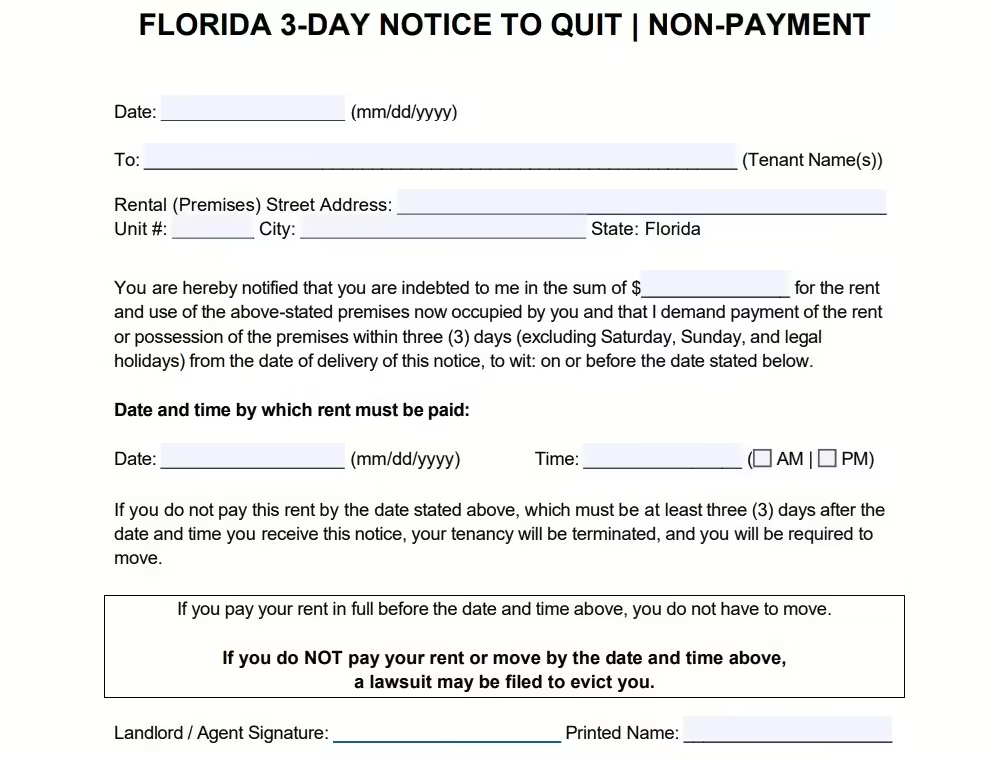The Florida eviction action, known as the ‘Eviction Process’, is a quick and economical process, which offers great legal certainty for owners who want to earn income from renting real estate. This is another advantage of investing in real estate in Florida. This article provides a detailed explanation of how the eviction process works.
Also see: 5 things you need to know before renting your property in Florida

How does the Eviction process begin in Florida?
Tenants cannot be legally obliged to vacate the property unless they have been duly notified.
By law, in Florida, it is necessary to wait 8 days of delay in paying the rent to start the eviction action.
What is the “3-day Notice”?
Once the 8-day period has expired, it is mandatory to send a notification to the tenant, that is, a “written notice”.
This notification, known as ‘3-day notice’, must clearly specify the amount of rent due and inform that the tenant has three days to make the payment; otherwise, the lease agreement will be terminated
The ‘3-day notice’ is a standard form, as shown in the image below:

This notification needs to be physically delivered to the tenant. This can be done in person or an envelope with the notification can be glued to the door of the property, visibly.
What happens after the 3-day deadline of notification has expired?
The times we had to send the ‘3-day notice’ to tenants of the properties we manage, the amount was paid before the expiration of the 3-day deadline.
In one of the cases, the tenant decided to leave the apartment before the 3-day deadline. The amount due, in this situation, was compensated with the security checks delivered by the tenant at the beginning of the contract.
In a single case, the tenant remained in the property and did not pay the outstanding amount. In this situation, Florida legislation, through Statute § 83.56(3), allows the tenant to initiate a judicial eviction proceeding. That’s what we did!
Even in this extreme situation, everything happened relatively quickly and at low costs. This will be explained in detail in the next topics!
File-to-Motion (second notification – extrajudicial)
After 3 days of notification, it is already possible to start the eviction process judicially. In practice, however, we also usually send a second extrajudicial notification, through a lawyer.
The lawyer prepares, in this case, a document called “File to Motion” to be sent by email to the tenant.
This step is interesting, because the tenant may not have seen the “3-day notice” yet for some reason. They may be traveling, for example. An extrajudicial notification, delivered by a lawyer, reinforces the collection process.
At this stage many tenants pay off the debt or leave the property. There are also situations in which a negotiation is initiated and, in an amicable way, the issue can be resolved.
If none of the previous steps work, then the eviction action by judicial means is initiated.
How long does the eviction action take in Florida?
Once the judicial eviction process has started, all procedures usually take between 35 and 40 days.
In this situation, the lawyer, once the eviction authorization has been received, hires a police officer to go to the property to break through the door and remove people and property from the place. If they resist, they may be forcibly removed.
All the furniture is removed and placed in front of the property.
The property lock is changed and the tenant no longer has access to the property. The process is then closed.
How much does the eviction process cost in Florida?
All costs, including lawyer’s fees and hiring of the police officer, add up to approximately US$ 1200.
Do you want to rent your property in Florida?
AMG International Realty is a global real estate agency specialized in Florida and aimed at the foreign public. If you have a property in Florida and are interested in renting it, please contact us. Contact us right now via WhatsApp: +1 305 498 6327 (Silvana Recalde)

